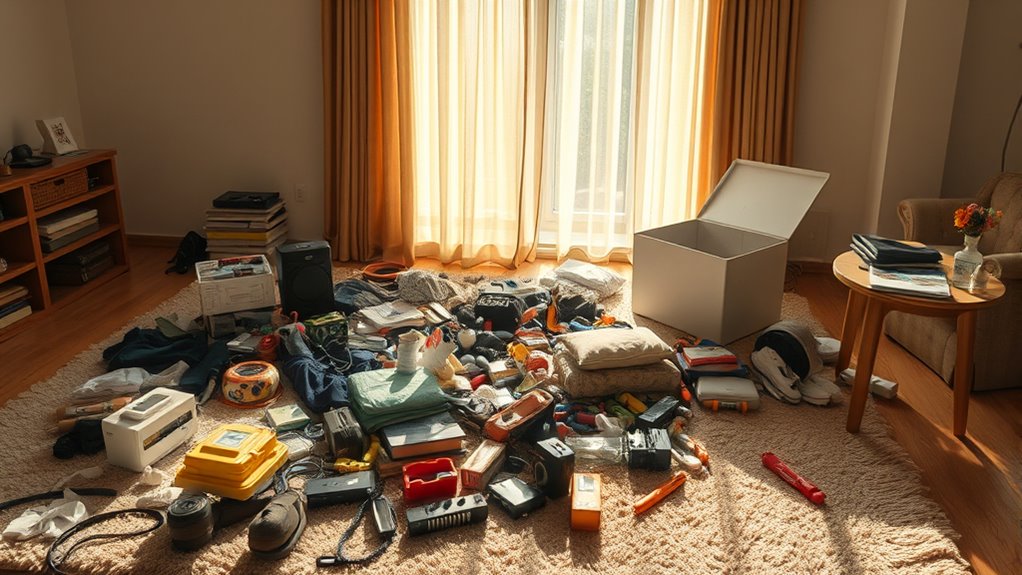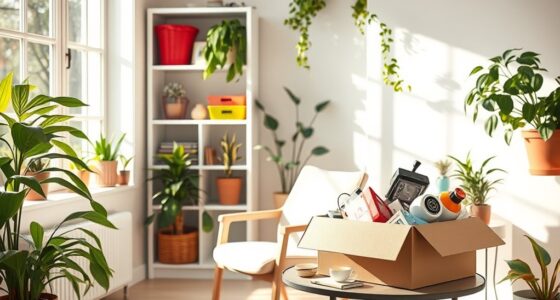One of the biggest mistakes you make while decluttering is not scheduling dedicated sessions. Without a plan, you can quickly feel overwhelmed as clutter builds up again. It's easy to lose focus, hide items instead of getting rid of them, or underestimate the time you need. Ignoring maintenance can also lead to chaos. Embracing decluttering as an ongoing process, rather than a one-time task, is essential for lasting results. Discover more strategies to enhance your decluttering journey.
Key Takeaways
- Failing to set clear, specific goals leads to aimless decluttering and minimal progress.
- Avoiding decisions about items creates procrastination, hindering the decluttering process.
- Relying on hiding clutter instead of removing it only exacerbates stress and chaos.
- Neglecting to schedule regular decluttering sessions results in overwhelming and inconsistent efforts.
- Ignoring emotional attachments can lead to decision paralysis and clutter retention.
Inadequate Scheduling of Decluttering Sessions
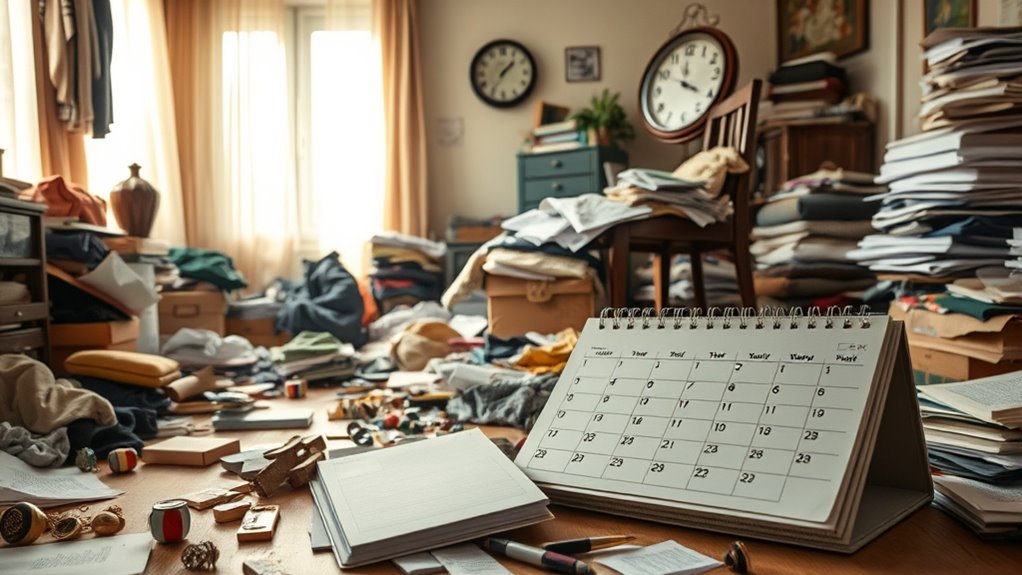
When you neglect to schedule your decluttering sessions, you're likely setting yourself up for frustration and overwhelm. Without a routine, your efforts become inconsistent, allowing clutter to accumulate again. If you don't allocate sufficient time, you risk decision fatigue or burnout, making the process feel daunting. Flexibility is crucial; adjust your schedule based on your emotional readiness or unexpected events. Pairing decluttering with existing habits can help, so it doesn't feel like an additional chore. Don't forget to incorporate regular breaks to keep your motivation high. Additionally, having a clear plan with measurable goals can significantly enhance your decluttering efficiency and keep you focused on your objectives.
Failing to Define Clear Goals

Scheduling your decluttering sessions lays the groundwork, but without clear goals, your efforts can quickly lose direction. Clear goals provide purpose and make the overwhelming task of decluttering more manageable.
Think of your goals as a roadmap; they help track your progress and keep you focused. Without them, you might feel daunted and uncertain about where to start.
Aim for SMART goals: be specific about what you want to declutter, ensure they're measurable, achievable, relevant, and time-bound. Prioritize areas that need the most attention, and set area-specific objectives. Identifying specific areas for decluttering can further enhance your goal-setting strategy.
Insufficient Time Allocation for Decluttering Tasks

Many people struggle with decluttering due to insufficient time allocation, making it one of the top hurdles in the process. About 47% of individuals cite a lack of time as their primary obstacle.
To combat this, it's essential to allocate specific time slots for decluttering tasks. Consider using techniques like the Pomodoro method, where you dedicate focused intervals to stay productive. Clutter can create a sense of chaos in living spaces, which further complicates the decluttering process.
Even small daily commitments can lead to significant progress over time. By scheduling sessions, you maintain consistency and prevent clutter from building up again.
When you manage your time effectively, you'll reduce stress, avoid procrastination, and improve your overall mental health while creating a more organized environment.
Lack of Focus During the Decluttering Process
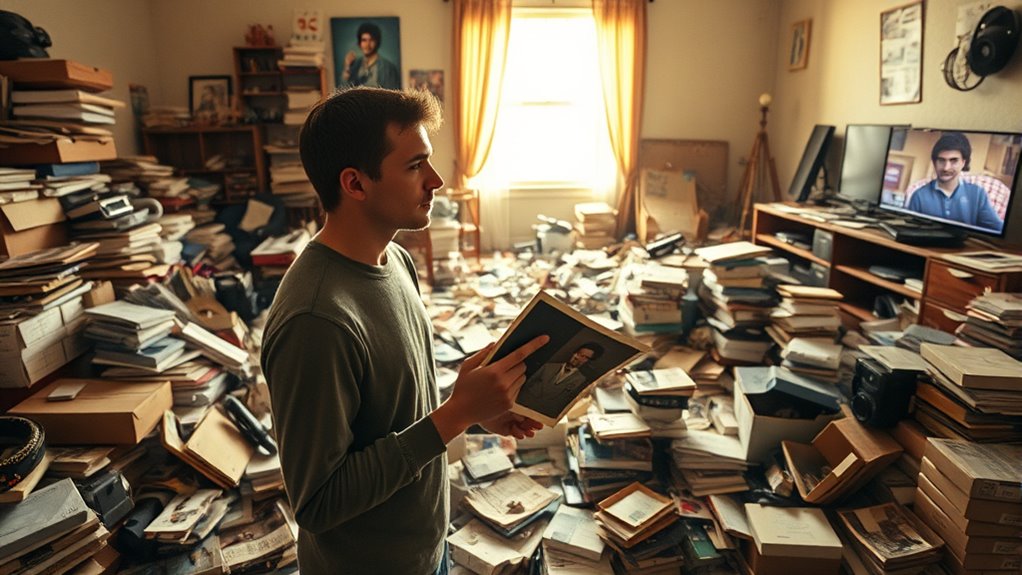
Although decluttering can be a straightforward task, a lack of focus often hampers your progress.
Decision paralysis can slow you down as you get stuck contemplating what to keep or toss. Distractions can derail your efforts, making it hard to stay on track. Emotional attachments to items may lead to indecision, while multitasking scatters your attention and decreases productivity. Without clear goals, your decluttering efforts lack direction. To stay focused, prioritize high-impact areas that stress you the most and set realistic, achievable objectives. Avoid getting sidetracked by unrelated tasks, and consider using timers to manage your time effectively. Implementing a personalized organizational system can also help maintain your focus and streamline the decluttering process. Additionally, practicing mindfulness techniques can enhance your present-moment awareness, making it easier to make decisions about what to keep and what to let go.
With better focus, you'll find decluttering becomes a more efficient and rewarding process.
Hiding Clutter Instead of Removing It

When you hide clutter instead of removing it, you're often just postponing the inevitable. This behavior usually stems from emotional attachments or the fear of needing items in the future. Common hiding spots like garages and attics only create wasted space and increase stress. You might feel guilt or anxiety about the clutter lurking out of sight, and that doesn't help your mental health. Remember, the costs add up—storage fees can be pricey, and you might spend more replacing things you can't find. By avoiding decisions, you hinder your progress. Instead of hiding, consider letting go of items that no longer serve you. Mindful decluttering strategies can help you effectively sort through your belongings and make clearer decisions. Simplifying visuals can enhance clarity and comprehension, just as embracing a clutter-free environment leads to a healthier, more peaceful life.
Delayed Decision-Making on Items
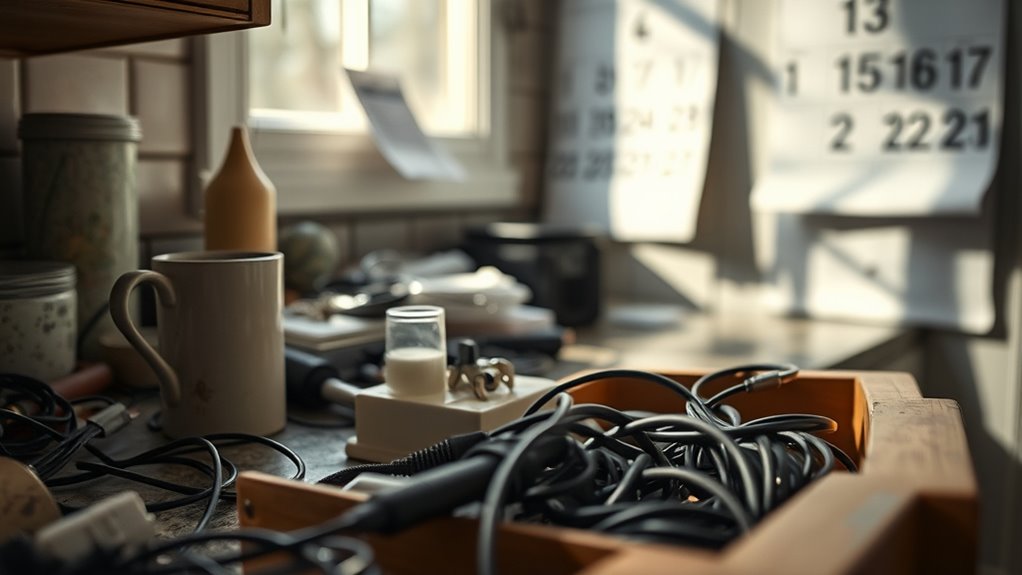
Delayed decision-making on items can significantly hinder your decluttering efforts, leaving you overwhelmed by clutter. When you postpone choices about what to keep or discard, clutter accumulates, increasing stress and decreasing productivity. Fear of scarcity, emotional attachment, and uncertainty about future needs often lead to this indecision. As clutter grows, it consumes your time and can diminish your quality of life. To combat this, implement clear decision-making processes and set deadlines for yourself. Taking immediate action after deciding is crucial to preventing clutter from re-accumulating. Establish criteria for keeping items, and remember that continuous learning about decluttering techniques can enhance your decision-making skills. Regular decluttering sessions will also maintain momentum and help you develop better decision-making skills. Remember, the sooner you decide, the sooner you can enjoy a more organized and functional space.
Ignoring Others' Sentimental Attachments

Ignoring others' sentimental attachments can derail the decluttering process and create unnecessary friction within families. When you fail to communicate your decluttering plans, misunderstandings can arise, leading to conflicts.
Respecting the emotional connections others have to certain items is crucial; disregarding these feelings can cause hurt and resistance. Involving family members in decision-making fosters cooperation and prevents resentment. Sentimental items symbolize values, memories, and life stories, making it important to acknowledge their significance. Additionally, narcissistic behavior can complicate relationships and make it harder to navigate the emotional landscape during decluttering.
Remember that items may hold cultural or historical significance, and dismissing this can feel disrespectful. Forcing others to part with cherished belongings without their consent can lead to emotional distress and strain relationships.
To avoid these pitfalls, encourage open dialogue, set shared goals, and handle sentimental items with care, ensuring a more harmonious decluttering experience.
Viewing Decluttering as a One-Time Task
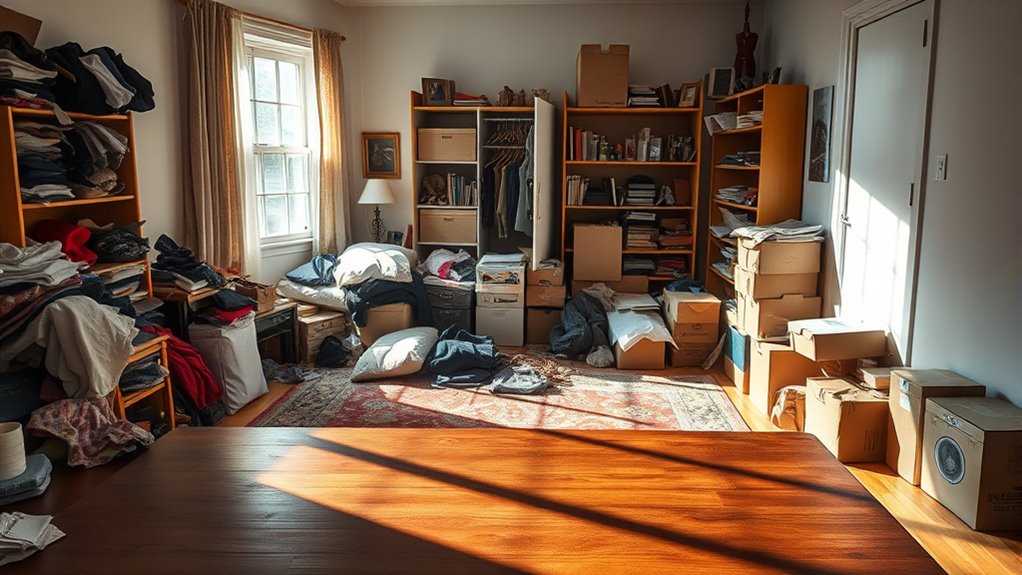
Many people mistakenly view decluttering as a one-time task, believing that once they've cleared out their space, it'll stay organized indefinitely. Unfortunately, clutter can quickly pile up again if you don't manage it regularly. This accumulation increases stress and hinders productivity, making it tough to focus. A cluttered environment can also lead to cognitive overload, triggering anxiety and feelings of guilt. Additionally, just like heat pumps improve air quality through regular maintenance, maintaining an organized space is essential for a healthier lifestyle. Over time, chronic clutter may even impact your physical health, contributing to lifestyle-related issues such as type 2 diabetes and heart disease. Without ongoing maintenance, your decluttering efforts might backfire, trapping you in a cycle of chaos and stress. To truly benefit from decluttering, you need to embrace it as an ongoing process rather than a one-off chore.
Not Implementing a Maintenance Routine
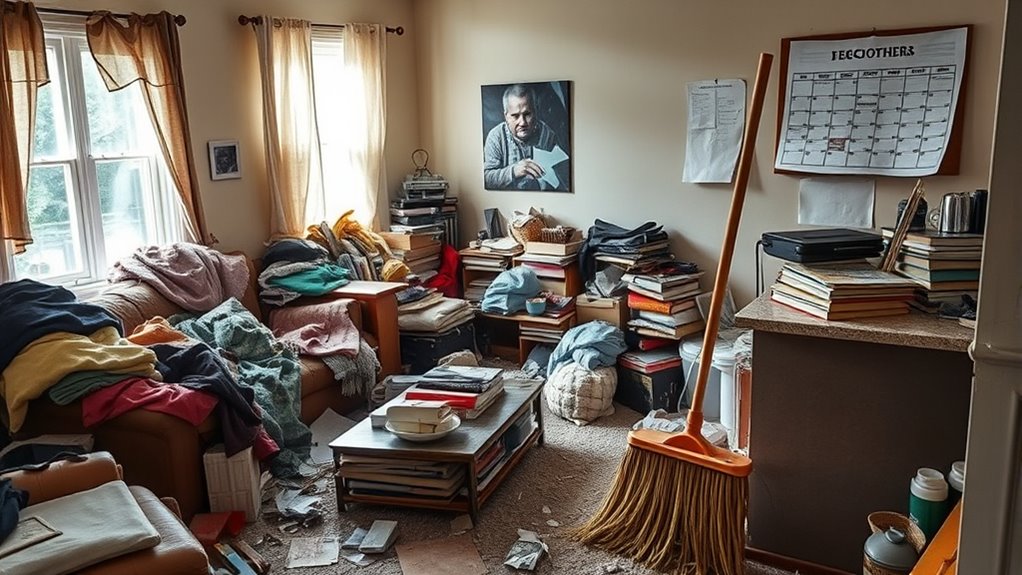
Once you've tackled the initial decluttering, maintaining that newfound organization is key to preventing chaos from creeping back in.
Daily tidying is essential; putting items back in their designated places helps keep clutter at bay. Schedule regular decluttering sessions to avoid accumulation over time, and ensure you use effective storage systems to keep surfaces clear. Consistent daily tidy ups can prevent the need for longer, more exhausting cleaning sessions in the future. Additionally, establishing clear goals for each space can enhance your maintenance routine and keep you motivated.
Don't forget seasonal purges to remove outdated items, and adopt mindful practices to make maintenance feel less like a chore. Ignoring these routines can lead to clutter accumulation, increased stress, and difficulty finding what you need.
Allowing Decided Items to Linger in the Home

Although you may have made the decision to declutter certain items, allowing them to linger in your home can quickly derail your progress. This indecision often leads to procrastination, making it tempting to reintegrate those items back into your space. Without a clear disposal plan, you might find yourself overwhelmed, reducing your motivation and increasing stress levels. To prevent this, act immediately: create a to-do list for donations or sales, set specific deadlines, and designate a drop-off day. Remember that not having a designated place for everything can also contribute to clutter reaccumulating. A well-organized home can foster a sense of well-being, so enlist help if needed and consider using technology to sell items quickly. By taking decisive action, you'll maintain your momentum and keep clutter from creeping back into your life. Don't let lingering items undermine your hard work!
Frequently Asked Questions
How Do I Start Decluttering if I'm Overwhelmed?
If you're feeling overwhelmed by decluttering, start small. Pick a single area, like a drawer or shelf, and set a timer for just 10-15 minutes.
Focus on decluttering only that space, and celebrate your progress. Create a simple to-do list to keep track of your tasks.
What Are Effective Ways to Motivate Others to Declutter?
To motivate others to declutter, start by creating a plan with clear goals and deadlines.
Invite friends over for a decluttering party; it makes the process fun and less daunting.
Highlight the benefits, like donating items to charity, and visualize how their space will improve.
Encourage them to share progress and celebrate small wins together.
How Can I Manage Emotional Attachments to Items?
To manage emotional attachments to items, start by recognizing the feelings tied to each object.
Try implementing the "touch things once" rule; handle items only when deciding to keep or let go.
Sort your belongings into categories, prioritizing what truly matters.
Consider seeking help from a professional organizer to gain perspective and objectivity.
Lastly, reflect on societal influences that may affect your attachments, allowing you to make more mindful choices.
What Should I Do With Items I No Longer Need?
When you've got items you no longer need, start by sorting them into categories.
For things in good condition, consider donating them to local charities or friends. If some items have value, try selling them online or at a consignment shop.
Don't forget to recycle or upcycle any materials that can be repurposed.
Finally, dispose of any trash properly to keep your space clutter-free and organized.
How Can I Prevent Clutter From Accumulating Again?
To prevent clutter from accumulating again, you should start by avoiding impulse purchases.
Create a shopping list to keep your focus. Cultivating gratitude for what you already own can help reduce the urge for more.
Set designated spaces for your belongings and practice daily tidying routines. Implement waiting periods before buying non-essentials, and limit exposure to shopping temptations.
Regularly reassess your items to maintain a clutter-free environment.
Conclusion
To truly declutter your space, focus on planning, prioritize your goals, and set aside dedicated time. Embrace the process, respect the attachments of those around you, and see decluttering as an ongoing journey rather than a one-off event. Create a maintenance routine, and don't let decided items linger in your home. By avoiding these common mistakes, you'll not only clear your space but also create a more peaceful, organized environment that reflects your true self.
